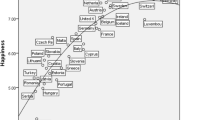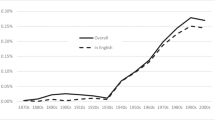Abstract
The historically high prevalence of property extraction in transition nations provides a unique opportunity to explore the intersection of institutional economics and the economics of happiness. This study examines how instances of prior property confiscation affect the self-reported quality of life following political-economic transition in Russia during the early 1990s. Using retrospective data from the Social Stratification in Eastern Europe after 1989 project, we estimate both traditional ordered logit models and random-effects ordered logit models, the latter of which addresses clustering of respondents by region of the country. Our results indicate that prior property confiscation experiences lead to a gap between the probabilities of realizing the extreme values of life satisfaction of 21.1–26.5%-points, with prior property confiscation experiences decreasing (increasing) the probability of greater (lesser) life satisfaction.

Similar content being viewed by others
Notes
The strongly negative effects of weak property and contracting rights on wealth formation and accumulation are commonly discussed, with Acemoglu et al. (2005) reporting that better institutional protections against expropriation are strongly correlated with higher GDP per capita.
For income, the marginal probabilities for the highest level of reported life satisfaction (“life is much better now”) extend to 0.4 percentage points, while those for the lowest level of reported life satisfaction (“life is much worse now”) extend to − 3%-points. For education, the marginal probabilities for the highest level of reported life satisfaction (“life is much better now”) extend to 0.1 percentage points, while those for the lowest level of reported life satisfaction (“life is much worse now”) extend to − 0.5%-points.
References
Acemoglu D, Johnson S, Robinson J (2005) Institutions as a fundamental cause of long-run economic growth. Handb Econ Growth 1A:386–472
Baumeister R, Bratslavsky E, Finkenauer C (2001) Bad is stronger than good. Rev Gen Psychol 5(4):212–370
Becchetti L (2010) The money-happiness relationship in transition: evidence from Albania. Transit Stud 17(1):39–62
Bennett DL, Nikolaev B (2017) Economic freedom and happiness inequality: friends or foes? Contemp Econ Policy 35(2):377–391
Blanchflower D, Freeman R (1997) The attitudinal legacy of communist labor relations. ILR Rev 50(3):438–459
Blanchflower DG, Oswald AJ (2005) Happiness and the human development index: the paradox of Australia. Aust Econ Rev 38(3):307–318
Carnevali E, Ystehede AP (2023) Is Socialism back? A review of contemporary economic literature. J Econ Surv 37(2):239–270
Caudill SB, Hill M (1995) Special interests and the internment of Japanese–Americans during world war II. Freeman 45(7):444–447
Caudill SB, Mixon FG Jr (2012) Human capital investment and the internment of Japanese Americans during WWII: a public choice approach. Int J Appl Econ 9(1):1–14
Caudill SB, Crofton SO, Long JE, Mixon FG Jr, Simonton MG (2015). In: Cebula RJ, Hall JC, Mixon FG Jr, Payne JE (eds) The impact of property confiscation experiences on individual patience in transition economies: an exploratory study. Economic behavior, economic freedom, and entrepreneurship. Edward Elgar, Northampton, MA, pp 124–133
Caudill SB, Crofton SO, Faria JR, Manage ND, Mixon FG Jr, Simonton MG (2020) Property confiscation and the intergenerational transmission of education in post-1948 Eastern Europe. Public Choice 184(1):1–41
Chin A (2005) Long run labor market effects of Japanese American internment during world war II on working-age male internees. J Law Econ 23(3):491–525
D’Ambrosio C, Jäntii M, Lepinteur A (2020) Money and happiness: income, wealth and subjective well-being. Soc Indic Res 148(1):47–66
Di Tella R, MacCulloch R, Oswald A (2003) The Macroeconomics of happiness. Rev Econ Stat 85(4):809–827
Diener E, Biswas-Diener R (2002) Will money increase subjective well-being? Soc Indic Res 57(2):119–169
Drèze HJ (1976) Some theory of labor management and participation. Econometrica 44(6):1125–1139
FitzRoy FR, Nolan MA (2020) Education, income and happiness: panel evidence for the UK. Empir Econ 58(2):2573–2592
Florea A, Caudill SB (2014) Happiness, religion, and economic transition. Econ Transit 22(1):1–12
Frey B, Stutzer A (2002) What can economists learn from happiness research? J Econ Lit 40(2):520–578
Grier K, Tullock G (1989) An empirical analysis of cross-national economic growth, 1951–1980. J Monet Econ 24(2):259–276
Gropper DM, Lawson RA, Thorne JT Jr (2011) Economic freedom and happiness. Cato J 31(2):237–255
Gwartney J, Lawson RA (2008) Economic Freedom of the World. Fraser Institute, Vancouver
Kalyuzhnova Y, Kambhampati U (2008) The determinants of individual happiness in Kazakhstan. Econ Syst 32(3):285–299
Latif E (2016) Happiness and comparison income: evidence from Canada. Soc Indic Res 128(1):161–177
Lelkes O (2006) Tasting freedom: happiness, religion and economic transition. J Econ Behav Organ 59(2):173–194
Manish GP, Mixon FG Jr, Thornton M (2021) Has the rise of socialism been a boon to Austrian economics? Evidence from social media and other metrics. Q J Austrian Econ 24(3):147–180
McCloskey D (2010) Bourgeois dignity: why economics can’t explain the modern world. University Chicago Press, Chicago, IL
Meade EJ (1972) The theory of labour-managed firms and of profit sharing. Econ J 82(1):402–428
Meade EJ (1974) Labour-managed firms in conditions of imperfect competition. Econ J 84(4):817–824
Namazie C, Sanfey P (2001) Happiness and transition: the case of Kyrgyzstan. Rev Dev Econ 5(3):392–405
Nikolaev B, Bennett DL (2017) Economic freedom and emotional well-being. J Reg Anal Policy 47(1):88–99
North D (1990) Institutions, institutional change, and economic performance. Cambridge University Press, Cambridge, U.K.
Ovaska T, Takashima R (2006) Economic policy and the level of self-perceived well-being: an international comparison. J Socio-Econ 35(2):308–325
Pregibon D (1979) Data analytic methods for generalized linear models. Doctoral Dissertation, University of Toronto
Roemer EJ (2015) Kantian optimization: a microfoundation for cooperation. J Public Econ 127(1):45–57
Saavedra M (2015) School quality and educational attainment: Japanese American internment as a natural experiment. Explor Econ Hist 57(1):59–78
Sanfey P, Teksoz U (2007) Does transition make you happy? Econ Transit 15(4):707–731
Silver H, Caudill SB, Mixon FG Jr (2017) Human capital and life satisfaction in economic transition: econometric evidence from pre- and post-Arab Spring Egypt. Economics of Transition 25(2):165–184
Szelenyi I, Treiman DJ (2012) Social stratification in Eastern Europe after 1989: general population survey. Department of Sociology, University of California at Los Angeles, Eastern European Group
Tsui H-C (2014) What Affects happiness: absolute income, relative income or expected income. J Policy Model 36(6):994–1007
Vanek J (1970) The general theory of labor-managed market economies. Cornell University Press, Ithaca, NY
Veenhoven R (2000) Freedom and happiness: a comparative study in 46 nations in the Early 1990s. In: Diener E, Suh EM (eds) Culture and subjective well-Being. The MIT Press, Cambridge, MA, pp 257–288
Acknowledgements
This study did not receive grant funding of any kind. The authors thank an anonymous reviewer for helpful comments on a prior version.
Author information
Authors and Affiliations
Corresponding author
Ethics declarations
Conflict of interest
The authors declare that they have no conflict of interest.
Human and animal participants
This article does not contain any studies with human participants or animals performed by any of the authors.
Additional information
Publisher's Note
Springer Nature remains neutral with regard to jurisdictional claims in published maps and institutional affiliations.
Rights and permissions
Springer Nature or its licensor (e.g. a society or other partner) holds exclusive rights to this article under a publishing agreement with the author(s) or other rightsholder(s); author self-archiving of the accepted manuscript version of this article is solely governed by the terms of such publishing agreement and applicable law.
About this article
Cite this article
Caudill, S.B., Faria, J.R., Mixon, F.G. et al. Expropriation, money, and happiness: the impact of state theft in Russia. Empir Econ 66, 483–501 (2024). https://doi.org/10.1007/s00181-023-02466-y
Received:
Accepted:
Published:
Issue Date:
DOI: https://doi.org/10.1007/s00181-023-02466-y




